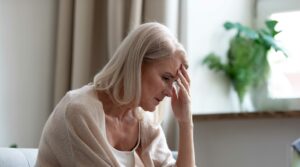Did you know that one in eight women has a chance of developing breast cancer in her lifetime? That’s an alarming statistic. Breast cancer is the most common cancer in U.S. women ages 15 to 39. As the number of young women diagnosed has risen over the recent decades, traditional medicine providers and researchers continue to scratch their heads instead of taking more aggressive steps towards promoting proactive and healthy habits.
As a functional medicine provider that is experienced in working with cancer cases, we apply the functional approach to alternative cancer treatment. The root of our philosophy and practices run deep into prevention and proactive therapies that aid in whole-body health.
There are certainly risk factors for many women which are outside of their control including genetic mutations, family history, and ethnicity. But there are plenty of risk factors that are within a woman’s control including sedentary lifestyle and body weight.
Our goal at Kare Health & Wellness is to help women understand how important and effective the proactive functional medicine approach is when it comes to breast cancer prevention. Regardless of your family history or genetic factors, you still have control of your current, personal choices and you can lower your risk using a functional approach to your health.
Functional Medicine Proactive Steps
The most basic way to be proactive in reducing your risk for breast cancer is to assess your everyday decisions and exposures. Although you can never eliminate all risk factors, your destiny is not totally out of your control. You can tip the scales in the right direction by making these simple changes:
- Limit or eliminate alcohol
- Do not smoke or vape
- Maintain a healthy weight
- Get adequate sleep
- Intermittent fasting. When we intermittently fast, we slow down the creation of reactive oxygen species, which promotes health of the mitochondria and also decreases the risk of carcinogenesis.
- Take your bra off. Bras significantly inhibit your lymph drainage and increase the temperature of your breasts. Women who wear a bra 24 hours a day are 125 times more likely to develop breast cancer than women who don’t wear a bra at all.
- Be physically active. Among other things, exercise keeps the lymph system working and boosts the immune system. A mini-trampoline is a very good way to increase lymph function. Women who exercise regularly have a much lower incidence of breast cancer.
- Choose organic foods. An organic, low carb Mediterranean diet is the best food plan to follow. This way of eating incorporates nuts and seeds, organic vegetables, herbs and spices like rosemary. These foods are some of our best cancer fighting tools.
- Choose a natural deodorant that is aluminum free.
- Maintain adequate levels of Vitamin D. Preferably from the sun, or D3 supplementation. Women with good levels of Vitamin D are 70% less likely to develop breast cancer.
- Avoid common everyday chemicals. Your disinfectants, nail polish, cosmetics, plastics, etc. Studies have found that exposure before the age of 30 to petrochemicals and acrylic triples a woman’s risk of developing breast cancer in her post-menopausal years.
We could write articles on each one of these points and how they help to reduce your risk of breast cancer. But the bigger picture is that it takes small, consistent, everyday decisions to help lower your exposure to toxins and known carcinogens.
Ditch Synthetic Hormones
As early as 2002, research reports have shown an increase in breast cancer risk linked to the use of synthetic progesterone in the form of medroxyprogesterone acetate (MPA). While doctors stopped prescribing synthetic hormone replacements, most providers failed to understand the difference between using natural, bioidentical hormones like natural progesterone, and synthetic hormones.
Additional studies released in 2019, again, showed women given synthetic progesterone significantly increased their breast cancer rates decades after they discontinued the synthetic hormones.
The 2019 findings found that after 19 years of follow-up, women who used MPA had a 29% significant increased risk in breast cancer. The original 2002 study found a 26% increase risk in breast cancer with MPA use. In terms of death from breast cancer, the 2019 report found a 45% increase in deaths from breast cancer in women who used MPA.
While every person is different, the goal of reducing the risk of breast cancer remains the same. Avoid taking all synthetic hormones. Toxic hormones similar to MPA are found in birth control pills and IUD devices. It should be no surprise that birth control pills and IUDs have been associated with an increased breast cancer risk.
Instead of synthetic hormones, we prescribe bioidentical hormones that are identical in molecular structure and function to the hormones produced in the human body, which can make them easier to metabolize and correct imbalances. You can read more about our use of natural, bioidentical hormones here.
Thermography
Early detection of breast cancer is one of the keys to significantly improving survival rates. In fact, it’s estimated that up to 95 percent of breast cancer cases can be overcome when the cancer is detected in its earliest stages.
Infrared thermography is the technique of converting infrared energy (radiant heat) into an image that can be seen. All substances in the universe give off some heat in the form of radiation naturally, and the amount of radiation emitted increases with temperature. The more hot spots seen on camera, the higher the risk.
Thermography can detect cancer up to 12 years before it occurs. Therefore, if you have a thermogram that indicates you are at high risk of cancer, you can make changes that can reverse the process before it’s too late.
Mammograms detect cancer that has already occurred. Thermography tells us if the conditions in the breast are conducive for cancer. It allows us to know if we are getting close to developing cancer.
Mammograms test the anatomy and are meant for correction while thermography tests physiology and is designed for prevention. Thermography identifies your risk of developing cancer, while mammography identifies the presence of cancer.
A thermogram is safe, painless, there is no compression of the breast, and it does not expose the body to radiation. A thermogram can also be used to monitor whether treatment is working in someone who already has cancer.
Additionally, thermography can also detect other problems like varicose veins, vascular problems, neurological problems, discs, tumors in the abdomen, and dental problems like TMJ.
Test. Don’t Guess.
Our goal with functional medicine is to help our patients lower their risk of developing breast cancer, at any age. By using effective testing options, we can create a personalized plan to guide women in the right direction.
DUTCH testing has been an effective tool to help mitigate some of the risks our patients face. DUTCH stands for Dried Urine Test for Comprehensive Hormones. The test measures your hormone metabolites from dried urine samples. When assessing a woman’s risk for breast cancer, the DUTCH test can help providers recognize patterns of concern such as:
- Estrogen excess and Estrogen dominance
- Flat cortisol slope and / or high nighttime cortisol levels
- Low Melatonin
…and more.
DUTCH test results help detect any hormone imbalances. Together, our patients and providers develop a plan that is tailored to the patient. Based on the results and plan, it may be beneficial to retest patients three to six months later, and perhaps yearly after that. We are excited to offer DUTCH testing to our patients as an additional layer of proactive functional medical care.
While breast cancer statistics and trending numbers look scary, the good news is that there are many factors you have control over in your life. You’re in the driver’s seat.
You play the most important part in your health. By taking a functional medicine approach and being proactive with your choices and preventative in your journey, you can reduce the risk of breast cancer.
If you’re interested in more information about hormone testing or becoming a patient, contact our office.








